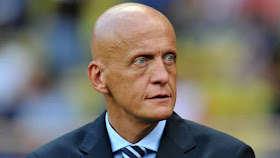Former World Cup final referee Pierluigi Collina has welcomed the introduction of video technology trials to assist officials and said on Sunday that it will end years of frustration for the men in the middle. Collina, the most distinctive and famous referee of modern times, remembered for his piercing blue eyes and bald head, also said the revised laws of the game were a major development in bringing all interested parties in the game together. The decisions to allow a two-year experiment with video technology and change a number of the game's laws were announced by football's law-making body, the International Football Association Board (IFAB), after a meeting in Cardiff. The laws, extensively rewritten for the first time since they were formulated in the 19th century, have been edited from 22,000 to 12,000 words by former Premier League referee David Elleray with some input from, among others, Collina, who took charge of the 2002 World Cup final between Brazil and Germany.
The 56-year-old Italian, who is now UEFA's head of refereeing, said in a telephone interview with Reuters from his home in Forte dei Marmi, Italy that he welcomed the changes, which have been made following years of debate. "Being a referee and being assessed, not based on what we can see but by TV camera images, leaves many referees frustrated," he said. "Half of the football community cannot understand that a mistake committed by the referee is only committed because he is a human being and cannot see every incident. So the use of video assistance will help the referee enormously. I am not sceptical about this. The referee on the field tries to do his best but he has not been assessed on what he can see, but what the television shows. Just think how difficult it is to correctly assess an offside incident sometimes, for example."
Collina, who until last week worked closely with new FIFA president Gianni Infantino in the latter's role as UEFA's general secretary, agrees that the Swiss is right to take a cautious approach now he is in football's top job. "As Gianni Infantino said in Cardiff, we have to be cautious because there are instances in play which are difficult to assess by TV images," said Collina. "Imagine a push. It is difficult to assess the intensity of a push by television and there are other areas which could create problems, but generally speaking we have taken a big step forwards. At UEFA we have done our best to support the referee. But certainly if you have 32 cameras positioned at different angles with high definition, the referee cannot see what 32 cameras can show, that's impossible. In the past that has been frustrating for the referee but now we can see if some of this technology can help the referee and that is very positive."
One of the major revisions to the laws, also for a trial period, is downgrading the so-called "triple punishment" of sending off, penalty and suspension for denying an opponent a goal-scoring opportunity in the penalty area. Players will now be cautioned rather than red-carded if they make a serious attempt to get the ball but commit a foul, and Collina is delighted with the change. "We at UEFA are happy about this as we worked hard to achieve this," he said. "It is something very positive as the entire world of football - players, coaches and everyone - has been asking for this for a long time and we are delighted that this change will be implemented from Euro 2016."
Another law change likely to have a significant impact is that in future a player who has been injured by a reckless and cautionable challenge does not have to leave the field after treatment and wait to be waved back on by the referee. "This was something that needed to be changed and I am proud we made this contribution to IFAB and IFAB has put this change in place," said Collina. "It restores fair play and means that the team victimised is not playing 10 against 11 for a while."
The law changes will take effect from June 1 and be in place for the 2016 European Championship in France, with video trials implemented no later than the start of the 2017-2018 season.
Source: Reuters
